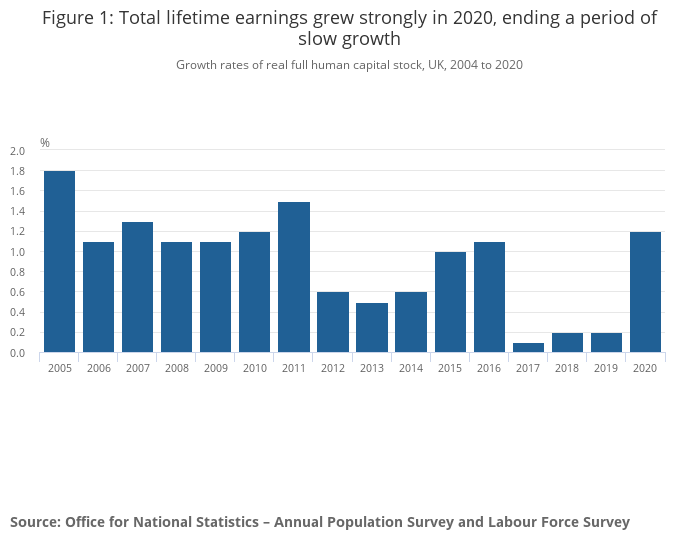Average Lifetime Earnings UK – Who Makes the Most Money?
12/01/2024


Last Updated: 12 Jan 2024
Read time: 6 minutes
Written by: Lauren McAfee
Insurance Writer and Editor
Written in line with our Editorial Guidelines
With rising costs across life’s many expenses in the UK, evaluating your earnings is more important than ever. We know that wages are not currently rising in accordance with inflation, but when we zoom out, who is really in the best position to make the most money over their lifetime?
Looking at UK average lifetime earnings across various generations, genders, and occupations tells an interesting story. And seeing where you fit in the scheme of things can help give you perspective on your earning potential, and consider if there are changes you can make to safeguard your financial future.
How much does the average person make in a lifetime?
In 2020, the Office for National Statistics reported that the UK’s full human capital stock, (the lifetime earnings of working age people), was worth £23.8 trillion.
This statistic equates to an average lifetime earning of £566,000 per person.
Of course, these statistics have been affected by the pandemic, where one in four people were put on furlough at some point between March 2020 and June 2021. But even before 2020, lifetime earnings were in a period of slow growth and actually spiked in 2020 to 1.1% growth. This was a great increase when compared to the 0.2% in the two previous years.
This growth was credited to an increase in the number of people with higher education accreditations entering the workforce. But as we will see, several more circumstances impact the earning potential of demographics in the UK.

Average Income over a Lifetime – Key Statistics
- The average person in the UK will earn £566,000 over their life.
- People with a degree earn 53% more than those with no qualifications.
- Men see 30% more returns on their undergraduate degrees than women with the same qualifications.
- The financial & insurance industry has the highest average earnings in the UK with £78,000 a year.
- Gen X (40-49 year olds) make the most money with an average of £38,755 annually.
Average Lifetime Earnings Across UK Demographics
Does education affect average lifetime earnings in the UK?
The latest data credits the latest growth in total lifetime earnings in the UK to an increase in educational attainment. 1.2 million more people had an undergraduate degree, master’s degree, or a PhD compared with the previous year.
This also affected individuals’ earnings during the pandemic, as employees with GCSEs as their highest qualification were more likely to have been furloughed than those with degrees or equivalent qualifications.
| Education | Annual salary |
| Degree or equivalent | £30,524 |
| Higher education | £23,400 |
| GCE A level or equivalent | £19,188 |
| GCSE grades A*-C or equivalent | £17,212 |
| Other qualification | £17,420 |
| No qualification | £14,300 |
| Don’t know | £18,616 |
The net lifetime return of pursuing an undergraduate degree (the sum of the increase in earnings and grants, minus student loan repayments and taxes paid) is around £100k for women and £130k for men. This means men see 30% more monetary returns for doing the same work and gaining the same qualifications as women. A pattern that unfortunately permeates the financial world.
What industry has the highest average lifetime earnings in the UK?
The latest data from 2023 sheds light on the average earnings across occupations within various industries in the UK, highlighting notable differences based on people’s workplace.
These could logically align with the salaries of the occupations and the nature of the work within them in terms of regular hours and job instability. These can all affect earning potential and financial planning in the long term.
| UK Industry | Average Annual Earnings |
| Electricity, Gas and Water Supply | £33,592 |
| Construction | £45,084 |
| Real Estate Activities | £35,048 |
| Education | £27,976 |
| Financial & Insurance Activities | £78,000 |
| Information and Communication | £64,948 |
| Administrative and Support Service Activities | £32,240 |
| Arts, Entertainment and Recreation | £25,896 |
| Professional, Scientific & Technical Activities | £51,532 |
| Accommodation and Food Service Activities | £16,276 |
What gender has the highest average lifetime earnings in the UK?
Although research reports the differences in average earnings for UK women and men, there is a clear omission of other genders from financial research.
What we can see is a continuation of the discrepancy in how much women benefit financially from their bachelor’s degrees when compared to men. This is consistent over the wider population as in 2020, the average collective UK population’s lifetime earnings were as follows:
- Men – £14.52 Trillion
- Women – £ 9.25 Trillion
This is an eyewatering 56% more earnings for men over their lifetime. Women have consistently lower average earnings than men across every age and generational grouping. And this discrepancy is consistent across all facets of financial life, including average savings.
However, this could be moving in the right direction with women’s total lifetime earnings increasing by 8.6% over 10 years while men’s total lifetime earnings increased by 6.5% over the same period. But with discrepancies starting early and escalating over time, it’s clear that a 8.6% rise over 10 years not going to cut it.
What generation has the highest average lifetime earnings in the UK?
With salaries typically increasing with time and experience, it makes sense that older people have higher average lifetime earnings than younger people. However, when considered across each generation, the latest statistics on annual earnings in 2023 reflect drastic differences.
| Generation | Age | Male Average Earnings | Female Average Earnings | Overall Average Earnings |
| Gen Z | 18 – 21 | £21,031 | £19,720 | £20,376 |
| Zillennials | 22 – 29 | £30,328 | £27,937 | £29,133 |
| Millennials | 30 – 39 | £38,382 | £33’740 | £38,382 |
| Gen X | 40 – 49 | £42,260 | £35,250 | £38,755 |
| Gen X | 50 – 59 | £40,000 | £32,648 | £36,324 |
| Baby Boomers | 60 + | £35,290 | £27,822 | £35,290 |
The generation with the highest earnings are 40-49 year olds, making 90% more than 18-21 year olds in the UK. This decreases again as workers get older. And although an ageing population still ensures there are high numbers of 50-66 year olds working in the UK, there is still a drop in the average earnings for this group.
Data and statistics on the UK’s average lifetime earnings reveal disparities across demographic earnings. These numbers are linked to broader economic and social disparities like the gender pay gap. But they can be informative and used to the extent of choosing education and career paths.
You can also get greater financial security through other methods besides earnings, including finding good savings accounts, exploring investment opportunities, or adopting better spending habits. Every step taken today contributes to a more secure financial future.
Sign up for more money saving tips
If you’d like more ideas on how you can save money on your insurance, sign up for our money saving tips now.
Sources
https://www.ons.gov.uk/peoplepopulationandcommunity/wellbeing/articles/humancapitalestimates/2004to2020
https://www.ons.gov.uk/employmentandlabourmarket/peopleinwork/employmentandemployeetypes/articles/anoverviewofworkerswhowerefurloughedintheuk/october2021?msclkid=3d71975bbbf611ec841030f1e44140f6
https://www.forbes.com/uk/advisor/business/average-uk-salary-by-age/
https://ifs.org.uk/sites/default/files/output_url_files/R167-The-impact-of-undergraduate-degrees-on-lifetime-earnings.pdf
https://luminate.prospects.ac.uk/graduate-salaries-in-the-uk
https://www.ons.gov.uk/employmentandlabourmarket/peopleinwork/earningsandworkinghours/datasets/averageweeklyearningsbyindustryearn03
https://www.statista.com/statistics/802183/annual-pay-employees-in-the-uk/
This article is intended as generic information only and is not intended to apply to anybody’s specific circumstances, demands or needs. The views expressed are not intended to provide any financial service or to give any recommendation or advice. Products and services are only mentioned for illustrative rather than promotional purposes